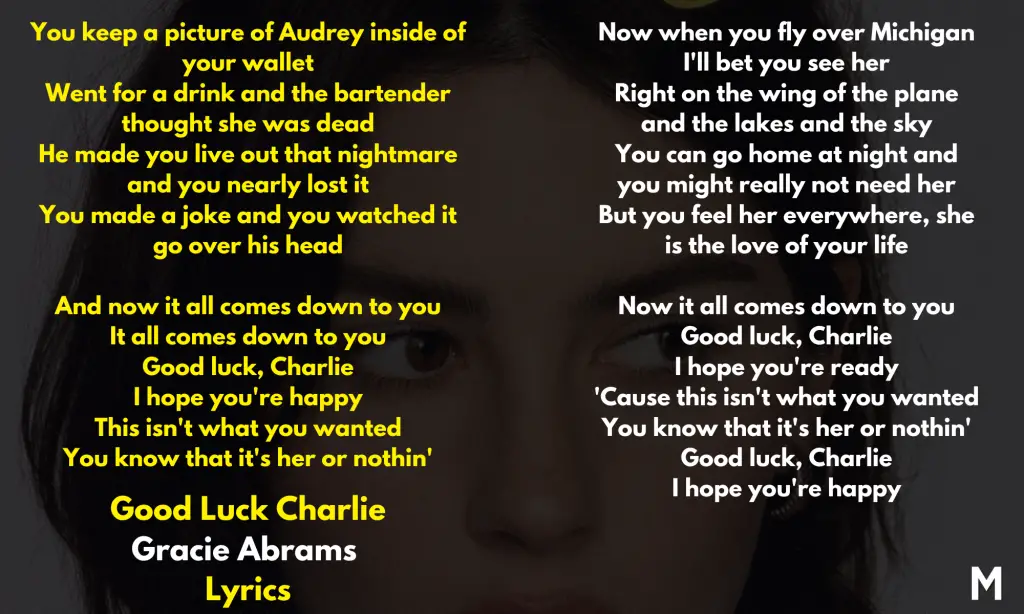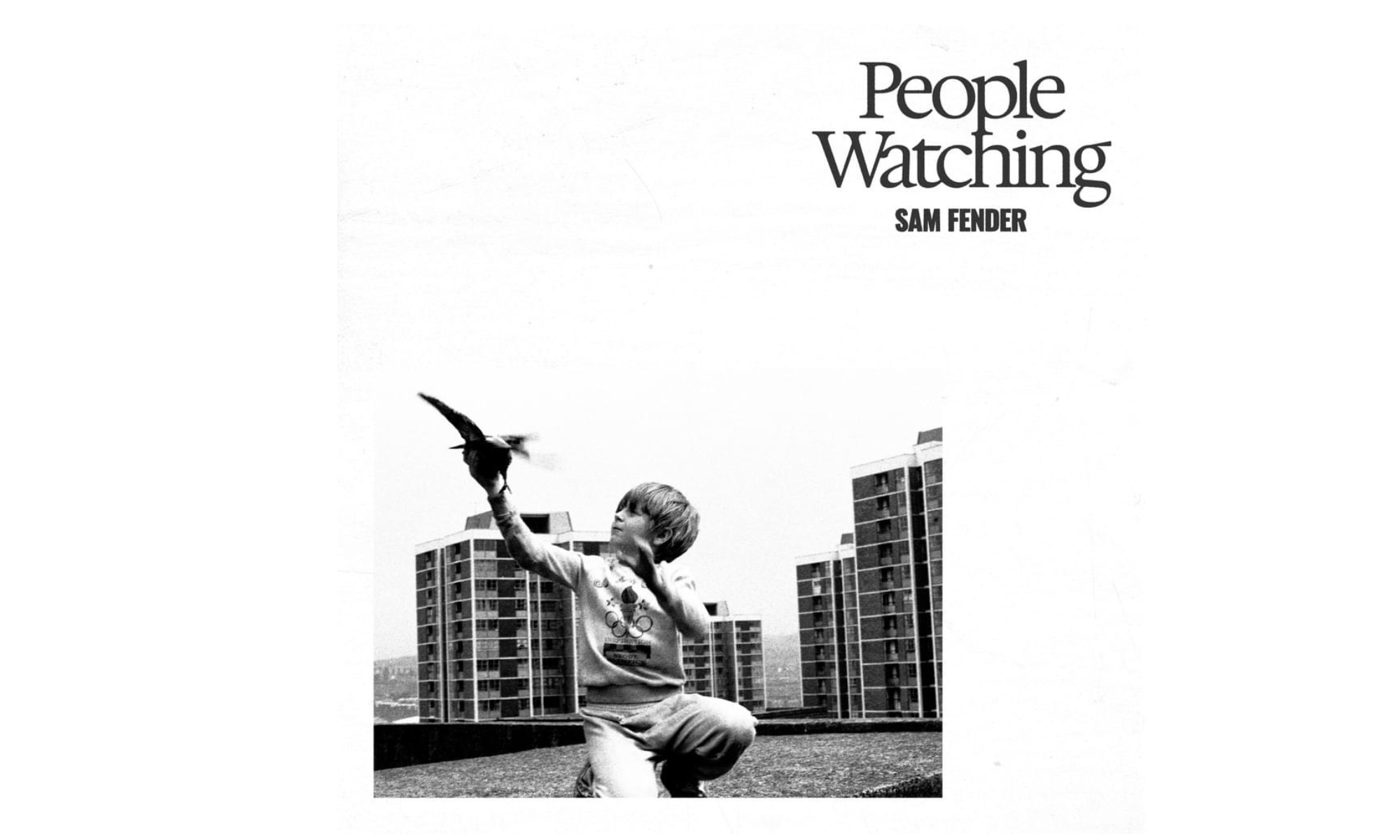Table of Contents
Image C/O Interscope Records
Gracie Abrams’ “Good Luck Charlie” is one of those songs that hits like a quiet gut punch. It’s simple and understated on the surface, but beneath the lyrics lies something bigger—an honest, bittersweet look at love, loss, and the memories that refuse to leave us alone. Abrams has this way of turning small moments—like a photo in a wallet or a drink with a stranger—into something much heavier, something that lingers. As I sat with this song, I couldn’t help but think about how it connects to the themes we see across Abrams’ work and how deeply relatable it feels to anyone who’s been haunted by someone they can’t quite let go of.
Now, I’m going to lean into my background in English literature and creative writing here to analyze the lyrics a little more poetically. These are just my own opinions, my own takeaways, but I hope to offer a new lens for looking at the song. After all, this feels like the perfect excuse to pull out some literary comparisons and see what history and storytelling can teach us about “Good Luck Charlie”.
This track isn’t just about longing—it’s about the way memories follow you, sometimes where you least expect them, and the hard truths you have to face when you’re still holding on to someone who’s already gone.
“Good Luck Charlie” at a Glance
- Lingering Presence: The song explores how small reminders—like a photo or a passing comment—can bring someone back into focus, even when they’re no longer in your life.
- Emotional Reckoning: Lines like “It all comes down to you” highlight the speaker’s moment of reckoning, where they’re forced to confront what it means to hold on or let go.
- Unresolved Goodbye: The repeated “Good luck, Charlie” feels like both a farewell and an admission—moving on isn’t easy when someone still feels like everything.
Gracie Abrams Good Luck Charlie Lyrics

Gracie Abrams Good Luck Charlie Meaning
“You keep a picture of Audrey inside of your wallet”
Right from the first line, we know Audrey is important. Keeping her picture in a wallet shows that her memory is always with the speaker. It’s small and personal, something they carry with them every single day. I think this tells us that Audrey isn’t just someone from their past—she’s someone they’re not ready to let go of.
This reminds me of Thomas Hardy’s poem “The Voice.” Hardy writes about hearing the voice of his late wife calling to him:
“Woman much missed, how you call to me, call to me.”
Like Hardy, the speaker in this song can’t escape Audrey, even though she’s no longer in their life. The photo in the wallet becomes a symbol of that lingering memory. It shows how the speaker wants to keep her close, even if it hurts.
What makes this even more powerful is that it’s such a quiet image. A wallet is something ordinary—something you don’t think about much. But that’s how grief works sometimes: it’s small moments, like seeing a photo, that bring someone back to life in your mind.
“Went for a drink and the bartender thought she was dead”
Here, the lyrics shift into a specific moment. The bartender sees the picture of Audrey and assumes she’s dead. That one mistake forces the speaker into a painful realization—they have to face the idea of losing Audrey, whether she’s physically gone or not.
This line connects perfectly to Christina Rossetti’s poem “Remember.” Rossetti writes:
“Remember me when I am gone away, / Gone far away into the silent land.”
In Rossetti’s poem, the person is asking to be remembered after they’re gone. The bartender’s assumption in the song brings up that same tension: Audrey isn’t around, but her memory is alive. For the speaker, that moment feels like a nightmare because it shows just how fragile their connection to her really is.
The next lyric—“you nearly lost it”—shows how strong the emotions are here. The bartender’s comment isn’t just awkward; it cuts deep. It’s a reminder that Audrey isn’t there anymore, at least not in the way the speaker wishes she was. Moments like this reveal how memory and grief can sneak up on us, even in ordinary places like a bar.
“Now when you fly over Michigan I’ll bet you see her”
This is one of the most vivid lines in the song. Flying over Michigan and seeing Audrey everywhere—on the wing of the plane, in the lakes, and in the sky—shows how memory follows the speaker wherever they go. Even when they’re physically moving forward, Audrey’s presence stays with them.
This reminds me of Thomas Hardy’s “The Voice” again. Hardy writes:
“Can it be you that I hear? Let me view you, then, / Standing as when I drew near to the town.”
In Hardy’s poem, the speaker imagines seeing his wife, even though he knows she isn’t really there. It’s the same in this song: Audrey isn’t physically on the wing of the plane, but her memory feels so real, it’s like the speaker can see her. The lakes and the sky add a sense of beauty but also emptiness—just like grief.
I think this part of the song captures how memory can feel inescapable. Even in places where you don’t expect it, someone’s presence can still be there. The speaker can’t “outrun” Audrey because she’s part of everything they see and feel.
“You can go home at night and you might really not need her”
Here, the speaker tries to convince themselves that they’re fine without Audrey. They say they might not “need” her anymore, but the very next line tells us the truth:
“But you feel her everywhere, she is the love of your life.”
This is such a powerful admission. Audrey isn’t just someone the speaker remembers—she’s the person who shaped their life. Even if they tell themselves they can move on, her presence is still everywhere.
This reminds me of Christina Rossetti’s lines in “Remember,” where she writes:
“Better by far you should forget and smile / Than that you should remember and be sad.”
Rossetti talks about the struggle between remembering someone and finding happiness. In this song, the speaker is caught in that same tension. They know they can’t “need” Audrey forever, but at the same time, they can’t forget her.
The line “she is the love of your life” makes it clear: the speaker isn’t ready to let go. Sometimes love leaves a mark so deep that even when someone is gone, they stay with us.
“It all comes down to you” / “Good luck, Charlie”
The repeated lines—“It all comes down to you” and “Good luck, Charlie”—give the song its final message. I think these lines are about the speaker talking to themselves, trying to find a way to move forward. They know they have to face the truth about Audrey’s absence.
This reminds me of Edward Thomas’s “Lights Out,” a poem about the finality of loss. Thomas writes:
“I have come to the end of the way / And the sleep must be taken.”
In Thomas’s poem, “sleep” is a metaphor for death or endings. It connects to the way the speaker in this song has to confront an ending they didn’t want. The repeated “Good luck, Charlie” sounds hopeful, but underneath, it’s bittersweet—like they’re saying goodbye to something they wish they could keep.
To me, this part of the song is about acceptance. The speaker knows they can’t hold on to Audrey forever, but letting go feels impossible. It’s a moment of reckoning, where the speaker has to face their grief and decide what comes next.
The Main Throughlines…
These lyrics give us small, sharp moments—like the photo of Audrey in a wallet or a bartender’s offhand comment—that build into something much heavier. To me, this speaks to the way memories follow you, even in places where you don’t expect them. The line “you feel her everywhere, she is the love of your life” says it all. The speaker can’t escape Audrey because her memory has become part of their everyday life. It reminds me of Thomas Hardy’s “The Voice,” where Hardy writes about hearing his late wife calling to him: “Woman much missed, how you call to me, call to me.”
In both cases, someone absent feels so real, they’re almost haunting. The line between memory and reality gets blurry, and that’s what makes these moments hit so hard.
The song also grapples with something I think a lot of people relate to: the struggle between holding on and letting go. The line “It all comes down to you” feels like a moment of reckoning—where the speaker realizes they can’t avoid their feelings anymore. It reminds me of Christina Rossetti’s “Remember,” where she writes: “Better by far you should forget and smile / Than that you should remember and be sad.”
Rossetti talks about the pain of being remembered after you’re gone, and while the message feels more forgiving, the tension is the same. In Gracie Abrams’ case, the speaker hasn’t reached that point of acceptance. Instead, they’re stuck between trying to move forward and knowing Audrey will always be “the love of [their] life.”
Finally, there’s an undercurrent of quiet resignation in the song—especially in the repeated refrain, “Good luck, Charlie.” It sounds like a farewell, but it’s bittersweet, as if the speaker knows letting go is necessary but doesn’t feel ready for it. This reminds me of Edward Thomas’ “Lights Out,” where he writes: “I have come to the end of the way / And the sleep must be taken.” Thomas uses “sleep” as a metaphor for death, but the feeling of inevitability connects to the speaker’s realization in this song. By the end, it’s clear they can’t keep holding on forever. The lyric “this isn’t what you wanted” feels like that painful moment when you realize the truth—things didn’t work out the way you hoped, and there’s no way to change it.
To me, what makes “Good Luck Charlie” so powerful is how it captures the way love and memory linger. Whether it’s Hardy’s ghostly voice, Rossetti’s plea for peace, or Thomas’ quiet acceptance, these writers have been exploring the same truths for years. Gracie Abrams ties into that tradition by showing how grief and longing live in the smallest details: a photo in your wallet, a passing comment, or the sky over Michigan. Her lyrics remind us that love doesn’t just disappear—it stays with us, shaping the way we see the world long after someone’s gone.
Will Vance is a professional music producer who has been involved in the industry for the better part of a decade and has been the managing editor at Magnetic Magazine since mid-2022. In that time period, he has published thousands of articles on music production, industry think pieces and educational articles about the music industry. Over the last decade as a professional music producer, Will Vance has also ran multiple successful and highly respected record labels in the industry, including Where The Heart Is Records as well as having launched a new label with a focus on community through Magnetic Magazine. When not running these labels or producing his own music, Vance is likely writing for other top industry sites like Waves or the Hyperbits Masterclass or working on his upcoming book on mindfulness in music production. On the rare chance he's not thinking about music production, he's probably running a game of Dungeons and Dragons with his friends which he has been the dungeon master for for many years.









